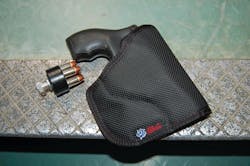Based on recent events and the threat against law enforcement officers nationwide let’s examine some basic tips and recommendations for your safety and survival.
1. Awareness and Ambush Prep – According to the National Law Enforcement Officers Memorial Fund (NLEOMF) in 2013 as in 2012 “Ambush attacks were again the leading circumstance of officer fatalities in firearms-related deaths.” Recent events have only reinforced that threat with officers ambushed in their own driveway returning home from work (Philadelphia), plainclothes officer shot in ambush behind the wheel of an unmarked car (Baltimore), and an LAPD officer shot inside a substation while working the lobby desk.
While wearing that police uniform, from walking out the door of your home headed to work, until you take it off after your shift – there is no safe time or place. You must monitor people and cars on the way in, throughout your shift and on your way home. You must constantly surveil your environment and what comes into it as the threat it presents to you.
2. Carry a Back-Up Gun (BUG) – I know the practice has fallen out of favor since the modern semi-auto pistol has come on the market with mag capacity of (15) rounds or greater. I understand but there are still many valid reasons to carry a BUG. Even with modern striker-fired pistols, things can go wrong and break. It is a Mr. Murphy kind of world. Pistols can break, jam and be lost or taken by a criminal suspect. “Onion Field Insurance” as back-up guns were once called, based on the tragic LAPD case where plainclothes officers Karl Hettinger and Ian Campbell were taken hostage in 1963 by two suspects who drove them to an onion field and executed Ian Campbell with Hettinger luckily running and escaping with his life, can keep you alive.
Over the last couple of months I’ve been carrying a Smith & Wesson M&P340 revolver as back-up both on and off-duty. Carried in a DeSantis pocket or ankle holster the 13.3 oz. five shooter disappears in a pocket or under a trouser leg. Overkill – I don’t think so. Heck, I’m never far from a rifle in these dangerous times.
3. Self-Care and Buddy Care – Carry a Combat Application Tourniquet (CAT) and some type of hemostatic agent such as QuickClot sponges while on-duty. Throughout the U.S. officers have saved police and citizen lives with CAT’s and other modern trauma care items. You and other officers are more at risk from dying from exsanguination (bleeding out) after being shot than dying from the actual gunshot. Modern LE has learned this from the battlefield and more and more cops are carrying CAT’s and hemostatic agents on the street. They are lifesavers, and inexpensive to purchase even if your agency won’t provide them.
Col. Dave Grossman states that officer deaths in this country would be approximately 20% greater if not for modern medical trauma care. By carrying a CAT and battlefield dressing or hemostatic agent, you are buying more time (possibly under fire) for paramedics to arrive or during transport to a hospital. The gear is relatively inexpensive and saves lives. Nuff said…
4. Talk it Out and Walk it Out – We lose far too many active and retired officers to suicide each year. Stress from the agency, the negative impact of shift work, alcohol abuse and availability of firearms oftentimes turns a depressed officer toward a quick and tragic solution – suicide. Over a 30 year plus police career I’ve had some tough times. During those stretches when people were really out to get me, I exercised by walking on a daily basis (my jogging days are long over), talked to my wife about what was going on and sought the solace of my friend and police chaplain Bob Denton.
I never contemplated suicide but a number of my coworkers have tragically killed themselves over the last few years and I’ve been to far too many funerals for officers dead by their own hands. There are some great programs and folks out there to talk to and help get you back on the right track. Building those support structures and folks you can count on to listen now, before you face the tough times, is much better than waiting until after things get bad and then looking for help.
5. Increase Your Knowledge Base – Being a professional means constant study. Being an effective LEO means reading and understanding the law and recent court rulings. Years ago I had a bench trial on a misdemeanor marijuana possession case. It was the first trial for a new assistant prosecutor and for the judge. I had to prompt the prosecutor and advise her on what questions to ask and strategy. Further, the judge got the law wrong on our chain of evidence (he would later apologize – kudos for that but he improperly acquitted the subject).
Since then and over the years I’m shocked by the attorneys who don’t understand use of force laws, or other police related legal practices. Lately it’s been improper interpretation of the laws of off-duty officers carrying concealed. I’ve often said that a working police officer has a better understanding of the laws than attorneys and judges. If you want to be good and effective, research and know the law.
6. Ego Check – Police officer’s egos oftentimes get them into trouble. None of us are ego free and being an effective officer means being confident, having self-esteem and respect. That said it isn’t about you it’s about the uniform you wear. Although it’s sometimes tough, try not to take things personal. When a suspect is disrespectful, they are disrespecting the uniform not you personally. I don’t give two cents for what an aggravated citizen on the street thinks about me or the job I’m doing. I will not be pulled into a verbal or physical altercation with an idiot. If use of force is necessary, I will use it based on the legal and tactical need, not based on what some mope deserves or because I’m being disrespected or challenged.
I find, at this stage in my career that manipulating subjects and getting what I want, psychologically and with effective communication skills less injurious and less complaint ridden than trying to force them or losing my temper arguing with an idiot.
7. Little Investments in Your Training Can Save Your Life – Truth is that you, working on your own at home, can improve your shooting and suspect control skills more than agency visits to the range and defensive tactics training. Taking those perishable skills such as weapon manipulation and shooting as well as DT and spending a few minutes each week practicing can reap huge dividends. A $100 heavy bag hung from the rafters in the basement or garage can keep your empty hand and baton striking sharp and powerful as well as maintaining fighting stamina. Why not incorporate suspect control skills into your fitness training – that is a win/win.
Dry-fire and practicing skills such as the draw stroke, trigger manipulation, sight alignment & sight picture as well as the other fundamentals of marksmanship improve live-fire shooting abilities. Pro shooters do it, why don’t you?
Training is the gift someone else gives to you. Practice is a gift to yourself. You cannot depend on the agency to train you. Little time blocks devoted to the basics of motor programs involved with using force reap benefits when it’s for real on the street.
Summation
Is this an all-inclusive list? Not hardly but it is a good place to start and certainly these attributes, the mental edge, and survival strategies that have shown themselves to work over the years. They are certainly topics that you can improve on your own and make an winning impact by training.
About the Author
Kevin Davis
Tactical Survival Contributor
Kevin R. Davis retired from the Akron Police Department after 31 years with a total of 39 years in law enforcement. Kevin was a street patrol officer, narcotics detective, full-time use of force, suspect control, and firearms instructor, and detective assigned to the Body Worn Camera Unit. Kevin is the author of Use of Force Investigations: A Manual for Law Enforcement, and is an active consultant and expert witness on use of force incidents. Kevin's website is https://kd-forcetraining.com/

